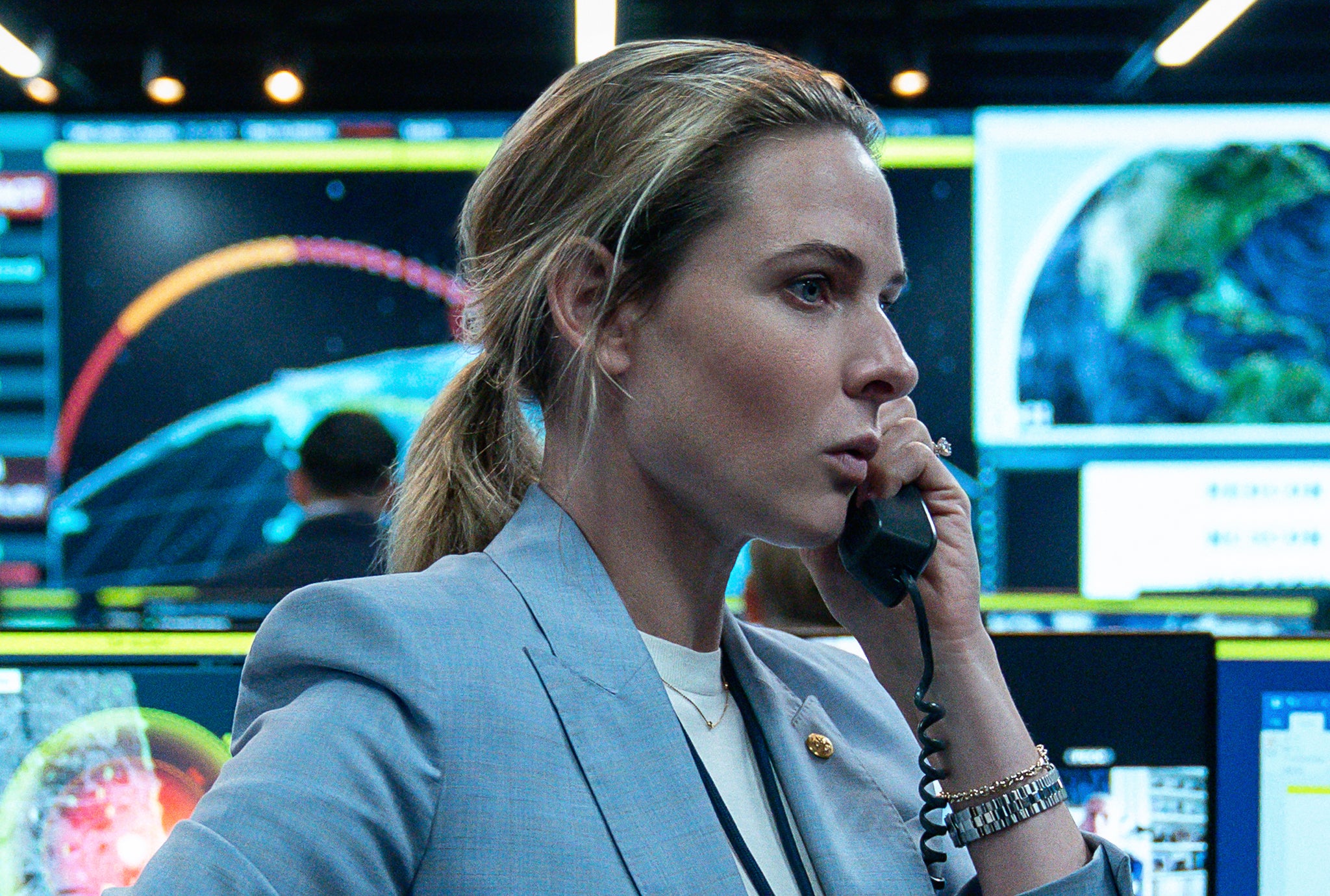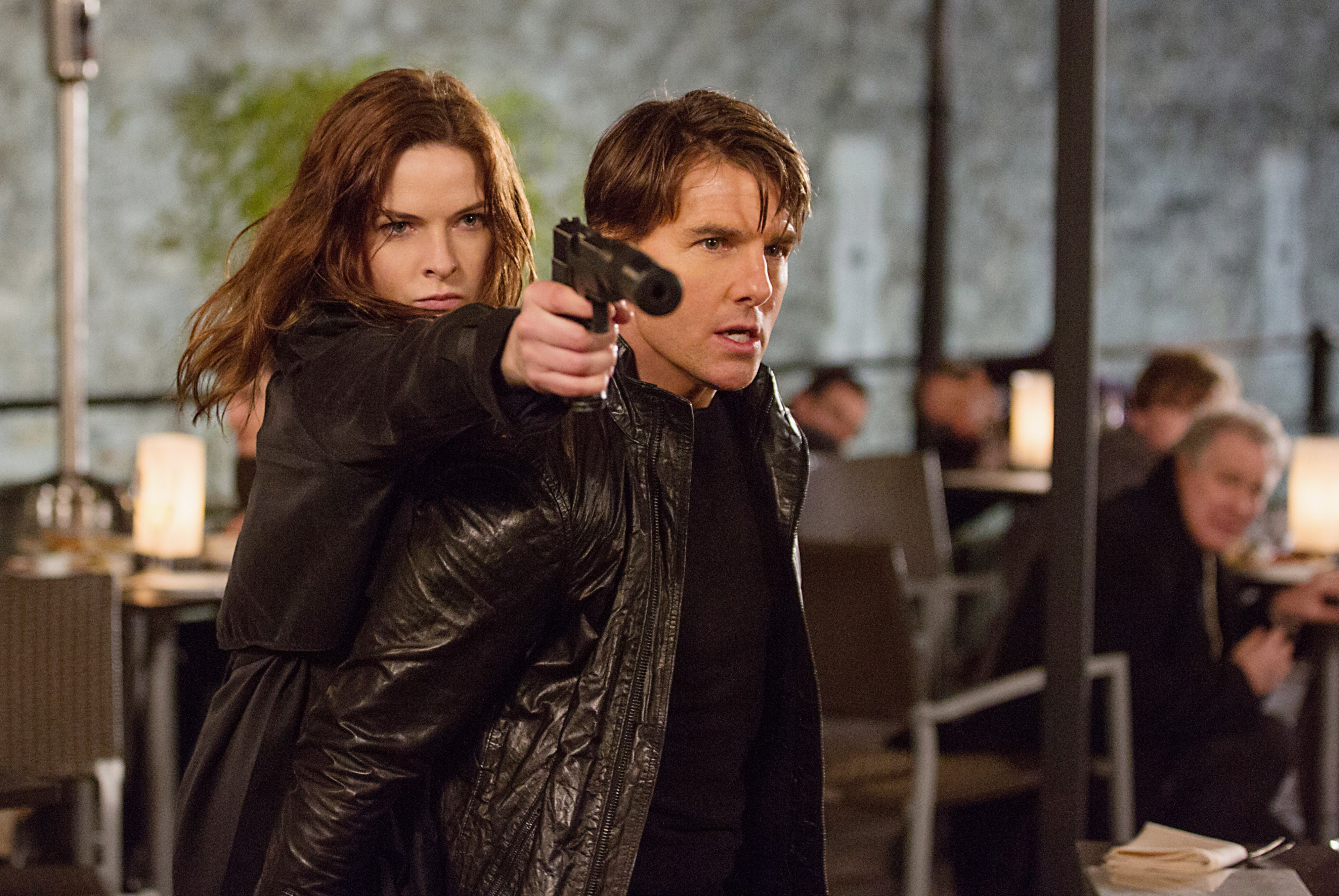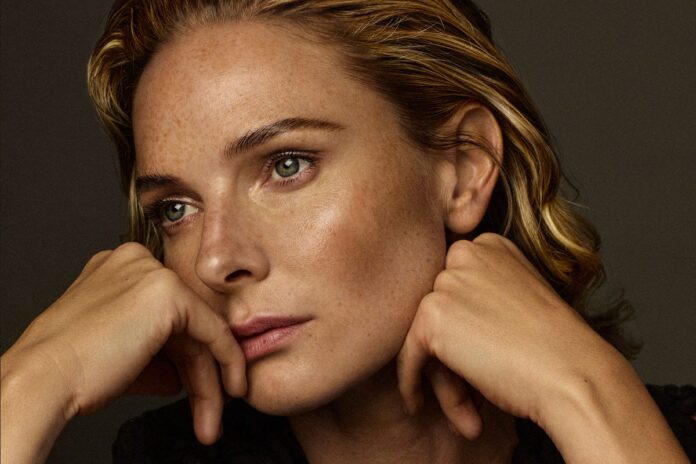Rebecca Ferguson, sweary Swede and fervid mother to the Lisan al-Gaib, has kicked off her boots and sent them flying. “F***ing fantastic,” she beams. She throws herself onto a hotel-suite sofa, crosses her legs, and takes a big gulp of iced water. Now the publicist must go. “Can you close the door enough that we can gossip, but keep it open enough so we don’t get locked in?” Ferguson asks. The publicist dutifully obliges. Ferguson has such force of command that I practically do it for her myself. If she were to ask me to kill a man on her behalf, I’d honestly consider it.
In A House of Dynamite, an apocalyptic real-time thriller from filmmaker Kathryn Bigelow, Ferguson plays the senior officer running the White House Situation Room when a single nuclear missile is launched at the United States. She’s a classic Bigelow character, in the mould of Jessica Chastain in Zero Dark Thirty or Angela Bassett in Strange Days: a woman of sturdy, no-nonsense authority, but with a soul. Ferguson is tremendous at it. I haven’t stopped thinking about a moment early on, when she scolds a White House neophyte for holding up the lunch queue by ordering an omelette. The silliest thing about A House of Dynamite is that this underling character just keeps on appearing in the film, rather than – as any actual human would be doing if they were read to filth by Rebecca Ferguson – simply cowering in a hole, never to be seen again.
I tell Ferguson that she is likely to stress out anyone watching the film when it arrives on Netflix – much as she did in Dune, or when she looked as if she could eat Tom Cruise for breakfast in a few of the Mission: Impossibles, or when playing an inexplicably top-hatted child-killer in the Shining sequel Doctor Sleep. She shrugs. “I answer phones well, and react to a nuclear disaster very well,” she says. “I don’t feel like I did that much.”
I sense she’s being modest. A House of Dynamite replays the same doomsday scenario three times from different perspectives – Idris Elba, Jared Harris and Gabriel Basso appear in other segments of the film – and it is never quite as urgent or emotionally draining once Ferguson slips off screen. But downplaying things seems to be how Ferguson rolls. When it comes to work, she always tends to want what she hasn’t yet had. “I just watched One Battle After Another, and it’s f***ing fantastic, and I think, ‘Yes! That’s what I want to do!’ And I remember watching Anora and just going, ‘F***! I want to play a stripper!’ I seek sensations. Something that gets inside of me and just f***ing twirls my intestines up like spaghetti. I want to experience something guttural.”
Has she ever experienced it in a role? Ferguson, dressed in a white jacket decorated with an enormous flower, her hair in tousled dirty-blonde waves, thinks about the question. And I mean really thinks about it. We sit in silence for eight long seconds, Ferguson studying the ceiling.
It came with a lot of very difficult things that people don’t see. You’re constantly living on tiptoes, which is exciting, and I love Tom Cruise, but you get to a point…
“I’m still looking for it,” she replies, finally. “I’ve been super blessed with the jobs I’ve done, but I have yet to find that thing.” She slaps her hands together, staring straight at me. Is it an eternal quest? “That’s the question! Have Daniel Day-Lewis or Isabelle Huppert found that thing? Did Mikey Madison feel it with Anora? Was there a moment when they went, ‘Yes – this is what I yearn for’?”
Ferguson – full of opinions and grand questions, and a fan of intimidatingly unbroken eye contact – has had an atypical career. She was born in Stockholm, and was encouraged to model and then to act by her mother, a Brit who had moved to Sweden at the age of 25. Ferguson was only relatively well known in her homeland for starring in a daytime soap opera called Ocean Ave when she was cast in The White Queen, a limited BBC series that first sent her to America. For her role as the pre-Tudor queen Elizabeth Woodville, she was nominated for a Golden Globe, which put her on Hollywood’s radar for all kinds of expensive blockbusters. It was a zero-to-100 trajectory that she thinks about often today.
“I mirror myself in Timothée Chalamet,” she says, of the industry supernova who plays her son in Dune. “I come from these fun, bombastic studio movies, the Mission movies, and he came from all of these small indies, or Call Me by Your Name. And that meant that he arrived at Dune from a completely different angle to me. It was so new for him, and so big. We’ve talked about it. I look at his career, thinking, ‘God, he’s lucky.’ I don’t know what those other worlds are like.”

Somewhat unusually, Ferguson has never acted in an independent – or an at least very low-budget American film – in her 11 years of working in Hollywood. Huge is all she’s ever known. She doesn’t begrudge it, she tells me, but it does go some way to explaining who she is as a person: how she handles herself, how she operates, the assurances she needs before signing on to something. Will it be fun? Who’s attached already? Are they fun? Will she be able to walk away from the shoot knowing that it was all worth it?
The very first American film she made was an expensive and ultimately unsuccessful version of Hercules, starring Dwayne Johnson and directed by Rush Hour’s Brett Ratner, which was released in 2014. It was, by all accounts, a difficult shoot, and she says it taught her everything about how to navigate the industry.
“The cast was phenomenal – Dwayne, and Rufus Sewell and John Hurt and Ian McShane,” she remembers. “The fact that it was all led by a misogynist pig named Brett Ratner? That’s something else.” It’s a withering aside that slips out of her so casually that I barely have time to take it in. “What I realised was how this world is set up. It was clear to me that you are very much alone on these sets, and the people who should have your back won’t necessarily have your back. When something uncomfortable happened, you didn’t have the support of the producers. It was an unsteady ground that shook me very much. I wasn’t personally ill-treated, but I saw things. I was aware. We were all aware.”

Last year, Ferguson alluded in an interview to a past experience with a male co-star whose behaviour towards her was so bullying that she called him out on it to his face. “Get off my set,” she told him. “I’m gonna work [with] a tennis ball. I never want to see you again.” Ferguson listed a number of men she wasn’t referring to (Johnson; Cruise; Hugh Jackman, who she starred with in The Greatest Showman), but it spawned an elaborate online guessing game that today she has mixed feelings about.
“I was f***ing furious when they were slagging off Ryan Reynolds,” she says, referring to her co-star in the 2017 sci-fi movie Life. “I loved working with him. He was f***ing amazing. And I know it’s interesting from a media point of view, but my intention was never to throw someone under the bus. The whole point was that I learned something from it. Some people push [that kind of thing] down. Some people don’t talk about it. But I have no problem standing up for myself.”
I tell Ferguson that, historically at least, Hollywood tends to favour compliance – female actors, in particular, get tarnished with all kinds of labels for calling out poor behaviour or demanding equity and fairness on sets. Did she worry about that happening to her? “I’ve never been scared,” she says. She turns away from me, staring at the floor. “That’s also a lie.” She thinks more, then returns her eyes to me. “At the beginning of a career, it’s actually very scary to be vocal, for anyone. The consequences are that you can lose a job, and not be liked. And all of these things are important things, right? Especially in the beginning. But I think gradually, as you grow up, you realise that it’s sometimes just not f***ing worth it.”
“I’m at a point now where I can choose to not work with d***heads,” she continues. “I like to have a good time on set, and I like it when people treat the team well. I have no interest in someone walking over people, or sitting with signs going ‘Don’t talk to me’, or whatever silly nonsense. Everyone has a technique, and I respect people’s technique. Some people are introverts, and some people don’t want to interact. That’s fine – you don’t have to. But let’s not be idiots about it.”
She tells me there’s an idea that the person who is No 1 on a call sheet must set the tone for the entire set, which she says is true – but it frequently backfires. “If everyone keeps treating the No 1 as a bloody king or a princess, you’re already putting them on a pedestal, rather than seeing all of this as a creative collaboration.” She lets out a big sigh, and tears off her jacket. “F***! God, I get so annoyed by it.”
A House of Dynamite was a brilliant set, she says. It was a real team effort, and everyone got along. Bigelow became a close friend to her, as did the actors playing her co-workers in the Situation Room. Many real-life workers there helped advise on the set, too. “I have difficulties with the whole idea of war, and the establishment of all of it, but I have an enormous respect for the people in that room and their knowledge,” she says.
The film came to her at a moment when, for the first time in years, she wasn’t committed to a franchise, having asked to be killed off in the Mission: Impossible films. The death of her character – a slippery, Catwoman-esque secret agent named Ilsa Faust – came at the midpoint of 2023’s Dead Reckoning, and it was a seismic loss that I’m not totally convinced the series was able to recover from.
“It was a phenomenal character, but you can exhaust a character,” says Ferguson. So much of the franchise was made on the fly, too, with the scripts being rewritten mid-shoot and schedules constantly being upended. “It came with a lot of very difficult things that people don’t see. Two seconds of footage are a product of months of training, and sometimes whole scenes are thrown out of the window and you’re told to pull together something different, because you’re shooting something else tomorrow. You’re constantly living on tiptoes, which is exciting, and I love Tom, but you get to a point…” She trails off. “Who knows what they had planned for [Ilsa]? But there was a natural break at the end of a contract for three films, and I think that suited all of us.”

She doesn’t know what she wants to do next. I tell her that, for someone known to be very funny in interviews, she’s never very funny on screen. Would she be up for a comedy? “No,” she says, and so abruptly and stone-faced that it can’t help but be hilarious. “I don’t try to be funny, and I’m not even sure what my humour is. I think my sheer bluntness makes people uncomfortable, and therein lies the humour, maybe?” She stretches her arm behind the back of her head. “I worry that if I actively tried to be funny in something, it wouldn’t be funny at all.”
What she does know is that she’s putting herself out there more, writing to directors she admires. Since Hercules, she’s followed a traditional route of American stardom. “You’re told you need to be able to be recognised, so make studio movies, build your [salary] quote, build your dream,” she says. “It’s the game, right?” But last year, while working on a very top-secret film version of Peaky Blinders that’s due for release in 2026, she saw how her co-star Cillian Murphy navigates the acting world, and took a leaf out of his book. “He is so much more personable than me,” she laughs. “He doesn’t go through agents, he writes letters. He’s old-school. And I was like, ‘F***… if Cillian does it, then I’m gonna do it.’ So I did it straight away, and it felt so good.”
She’s still, after all, looking for that thing.
“And I’ll always be looking,” she smiles. “Maybe one day I’ll find it.”
‘A House of Dynamite’ is in selected cinemas and streaming on Netflix now



